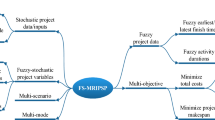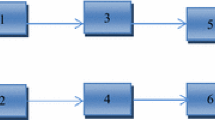Abstract
Resource allocation project scheduling problem (RCPSP) has been one of the challenging subjects amongst researchers in the past decades. Most of the researchers in this area have used deterministic variables; however, in a real project, activities are exposed to risks and uncertainties that cause delay in project’s duration. There are some researchers that have considered the risks for scheduling; however, new metahuristics are available to solve this problem for finding better solution with less computational time. In this paper, two new metahuristic algorithms are applied for solving fuzzy resource allocation project scheduling problem (FRCPSP), known as charged system search (CSS) and colliding body optimization (CBO). The results show that both of these algorithms find reasonable solutions; however, CBO finds the results in a less computational time, with a better quality. A case study is conducted to evaluate the performance and applicability of the proposed algorithms.

Extracted from [24]



adapted from Kolisch and Sprecher [10]




Similar content being viewed by others
References
Project Management Institute (2013) A guide to the project management body of knowledge (PMBOK), 5th edn. Four Campus Boulevard, Newtown Square, USA
Kolisch R, Padman R (2001) An integrated survey of deterministic project scheduling. Omega 29:249–272
Blazewicz J, Lenstra J, Rinnooy Kan A (1983) Scheduling subject to resource constraints: classification and complexity. Discret Appl Math 5:11–24
Kolisch R, Drexl A (1997) Local search for non-preemptive multi-mode resource constrained project scheduling. IIE Trans 29:987–999
Hindelang TJ, Muth JF (1979) A dynamic programming algorithm for decision CPM networks. Oper Res. 27(2):225–241
Patterson JH, Harvey RT (1979) An implicit enumeration algorithm for the time/cost tradeoff problem in project network analysis. Control Eng 4(2):107–117
Hartmann S, Drexl A (1998) Project scheduling with multiple modes: a comparison of exact algorithms. Networks. 32(4):283–297
Akkan C (1998) A Lagrangian heuristic for the discrete time–cost tradeoff problem for activity-on-arc project networks, in Working Paper, Koc University, Istanbul
Boctor F (1993) Heuristics for scheduling projects with resource restrictions and several resource-duration modes. Int J Prod Res. 31(11):2547–2558
Kolisch R, Sprecher A (1996) PSPLIB—a project scheduling problem library. Eur J Oper Res 96:205–216
Hartmann S (2001) Project scheduling with multiple modes: a genetic algorithm. Ann Oper Res 102:111–135
Chen PH, Weng H (2008) A two-phase GA model for resource-constrained project scheduling. Autom Constr 18:485–498
Alcaraz J, Maroto C, Ruiz R (2003) Solving the multi-mode resource-constrained project scheduling problem with genetic algorithms. J Oper Res Soc 54(6):614–626
Liu SX, Wang MG, Tang LX (2000) Genetic algorithm for the discrete time/cost trade-off problem in project network. J Northeast Univ (China) 21(3):257–259
Wuliang P, Chengen W (2008) A multi-mode resource-constrained discrete time–cost tradeoff problem and its genetic algorithm based solution. Int J Proj Manag 27(6):600–609
Kaveh A, Khanzadi M, Alipour M, Naraki MR (2015) CBO and CSS algorithms for resource allocation and time-cost trade-off. Period Polytech Civ Eng 59(3):361–371. doi:10.3311/PPci.7788
Milene B, Carvalho PY, Ekel Carlos APS, Martins Joel G, Pereira Jr (2005) Fuzzy set-based multi-objective allocation of resources: solution algorithms and applications. Nonlinear Anal: Theory, Methods & Applications 63:e715–e724. doi:10.1016/j.na.2005.02.053
Wang K-J, Lin Y-S (2007) Resource allocation by genetic algorithm with fuzzy inference. Expert Syst Appl 33:1025–1035
Zhang H, Xing F (2010) Fuzzy-multi-objective particle swarm optimization for time–cost–quality tradeoff in construction. Autom Constr 19:1067–1075
Kaveh A, Talatahari S (2010) A novel heuristic optimization method: charged system search. Acta Mech. 213(3–4):267–286
Kaveh A, Mahdavi VR (2014) Colliding bodies optimization: a novel meta-heuristic method. Comput Struct 139:18–27
Kaveh A (2014) Advances in metaheuristic algorithms for optimal design of structures. Springer, Switzerland
Zimmermann HJ (2001) Fuzzy set theory and its application, 4th edn. Kluwer Academic Publishers, Boston
Dong WM, Wong FS (1987) Fuzzy weighted averages and implementation of the extension principle. J Fuzzy Sets Syst 21:183–199
Zadeh LA (1975) The concept of a linguistic of a variable and its application to approximate reasoning. Inf Sci 8:199–249
Nasirzadeh F, Khanzadi M, Alipour M (2014) Determination of concession period in build-operate-transfer projects using fuzzy logic. Iran J Manag Stud. 7(2):423–442
Nasirzadeh F, Afshar A, Khanzadi M (2008) System dynamics approach for construction risk analysis. Int J Civ Eng IUST. 6(2):120–131
Kaveh A, Nikaeen M (2013) Optimum design of irregular grillage systems using CSS and ECSS algorithms with different boundary conditions. Int J Civ Eng Trans A Civ Eng. 11(3):143–153
Kaveh A, Safari H (2014) Hybrid-enhanced charged system search for solving travelling salesman problem and one of its applications: the single-row facility layout problem. Int J Civ Eng. 12(3):363–370
Kaveh A, Maniat M (2014) Damage detection in skeletal structures based on charged system search optimization using incomplete modal data. Int J Civ Eng IUST. 12(2):291–298
Author information
Authors and Affiliations
Corresponding author
Rights and permissions
About this article
Cite this article
Kaveh, A., Khanzadi, M. & Alipour, M. Fuzzy Resource Constraint Project Scheduling Problem Using CBO and CSS Algorithms. Int. J. Civ. Eng. 14, 325–337 (2016). https://doi.org/10.1007/s40999-016-0031-4
Received:
Revised:
Accepted:
Published:
Issue Date:
DOI: https://doi.org/10.1007/s40999-016-0031-4




